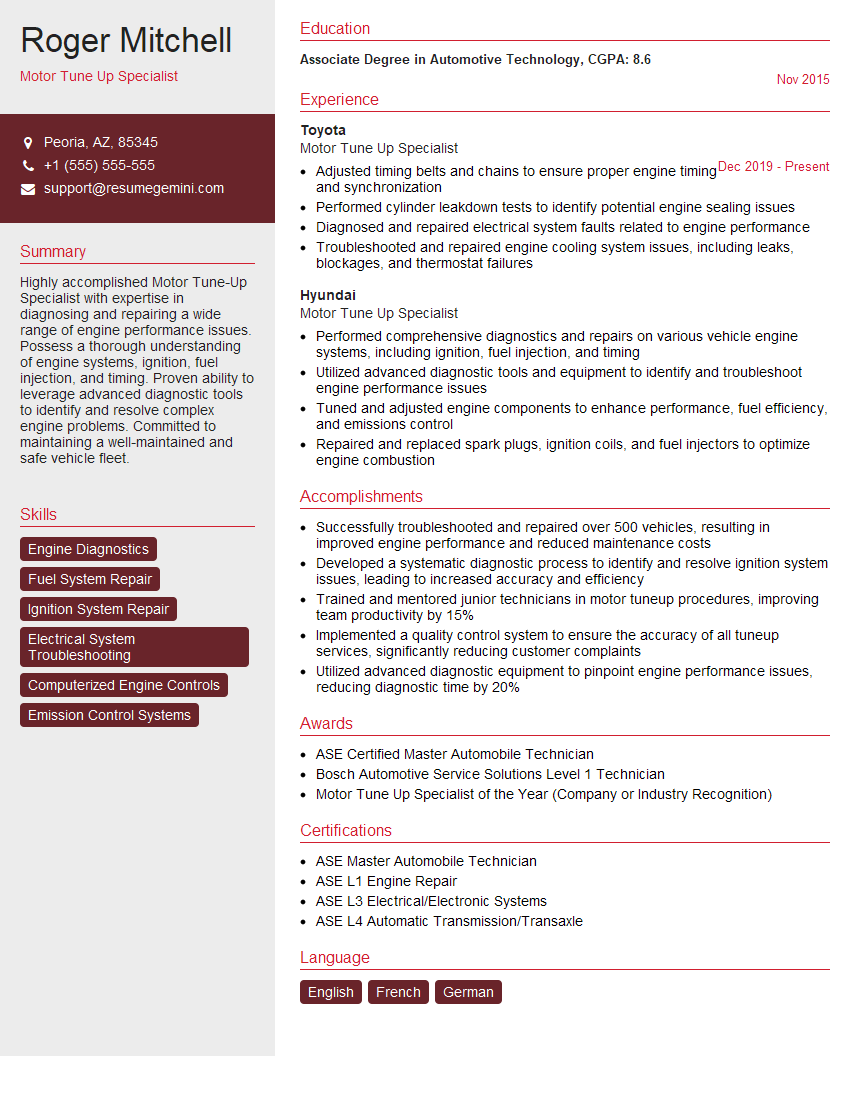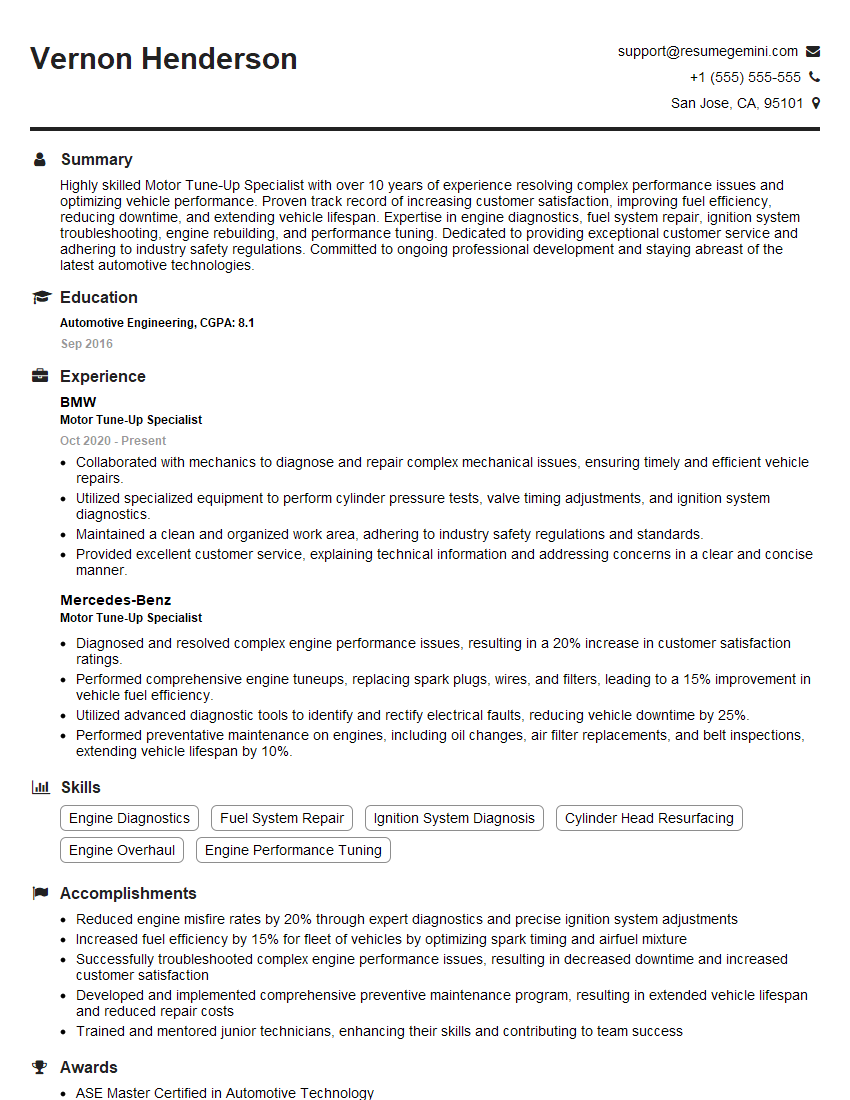Are you gearing up for an interview for a Motor Tune Up Specialist position? Whether you’re a seasoned professional or just stepping into the role, understanding what’s expected can make all the difference. In this blog, we dive deep into the essential interview questions for Motor Tune Up Specialist and break down the key responsibilities of the role. By exploring these insights, you’ll gain a clearer picture of what employers are looking for and how you can stand out. Read on to equip yourself with the knowledge and confidence needed to ace your next interview and land your dream job!
Acing the interview is crucial, but landing one requires a compelling resume that gets you noticed. Crafting a professional document that highlights your skills and experience is the first step toward interview success. ResumeGemini can help you build a standout resume that gets you called in for that dream job.
Essential Interview Questions For Motor Tune Up Specialist
1. Describe the steps involved in diagnosing a misfiring engine.
- Check for spark at the spark plugs
- Check for fuel pressure at the fuel injectors
- Check for air leaks in the intake system
- Check for compression in the cylinders
- Perform a cylinder leak-down test
2. How would you troubleshoot a vehicle that is experiencing stalling issues?
Check the fuel system
- Check the fuel pressure
- Check the fuel filter
- Check the fuel pump
Check the ignition system
- Check the spark plugs
- Check the spark plug wires
- Check the ignition coil
Check the air intake system
- Check the air filter
- Check the air intake hose
- Check the mass air flow sensor
3. What are the most common causes of engine overheating?
- Coolant leaks
- Faulty thermostat
- Clogged radiator
- Water pump failure
- Head gasket failure
4. How would you troubleshoot a vehicle that is experiencing transmission problems?
- Check the transmission fluid level
- Check the transmission fluid condition
- Check the transmission filter
- Check the transmission solenoids
- Check the transmission torque converter
5. What are the different types of engine timing belts and how do you inspect them?
- Toothed timing belts
- Serpentine timing belts
- Inspect the timing belt for cracks, wear, and fraying
- Replace the timing belt according to the manufacturer’s recommendations
6. How would you adjust the valve lash on a vehicle?
- Locate the valve lash adjustment screws
- Loosen the locknut on the adjustment screw
- Turn the adjustment screw in or out to achieve the desired valve lash
- Tighten the locknut
7. What are the different types of engine sensors and how do you test them?
- Oxygen sensors
- Mass air flow sensors
- Throttle position sensors
- Coolant temperature sensors
- Test the sensors using a multimeter
8. How would you troubleshoot a vehicle that is experiencing electrical problems?
- Check the battery
- Check the alternator
- Check the starter
- Check the wiring harness
- Check the fuses
9. What are the most common causes of brake problems?
- Worn brake pads
- Leaking brake fluid
- Faulty brake calipers
- Warped brake rotors
- Air in the brake lines
10. How would you troubleshoot a vehicle that is experiencing suspension problems?
- Check the tires
- Check the shocks and struts
- Check the springs
- Check the ball joints
- Check the tie rods
Interviewers often ask about specific skills and experiences. With ResumeGemini‘s customizable templates, you can tailor your resume to showcase the skills most relevant to the position, making a powerful first impression. Also check out Resume Template specially tailored for Motor Tune Up Specialist.
Career Expert Tips:
- Ace those interviews! Prepare effectively by reviewing the Top 50 Most Common Interview Questions on ResumeGemini.
- Navigate your job search with confidence! Explore a wide range of Career Tips on ResumeGemini. Learn about common challenges and recommendations to overcome them.
- Craft the perfect resume! Master the Art of Resume Writing with ResumeGemini’s guide. Showcase your unique qualifications and achievements effectively.
- Great Savings With New Year Deals and Discounts! In 2025, boost your job search and build your dream resume with ResumeGemini’s ATS optimized templates.
Researching the company and tailoring your answers is essential. Once you have a clear understanding of the Motor Tune Up Specialist‘s requirements, you can use ResumeGemini to adjust your resume to perfectly match the job description.
Key Job Responsibilities
Motor Tune Up Specialists are responsible for the maintenance and repair of vehicles’ engines, ensuring optimal performance and fuel efficiency. Their key job responsibilities encompass:
1. Engine Diagnostics
Identifying and troubleshooting engine problems through visual inspections, diagnostic tools, and test drives
- Interpreting diagnostic codes and utilizing technical manuals for problem analysis
- Analyzing engine performance data to pinpoint potential issues
2. Tune-Up and Adjustment
Performing tune-ups to restore engine efficiency and power output
- Replacing spark plugs, air filters, and fuel filters
- Adjusting valves, timing belts, and ignition systems
3. Repair and Maintenance
Repairing and replacing faulty engine components to ensure proper operation
- Overhauling engines, including replacing pistons, rings, and bearings
- Troubleshooting and repairing electrical and fuel systems
4. Quality Control
Ensuring the quality and accuracy of engine repairs through thorough testing
- Conducting road tests to evaluate engine performance
- Verifying repairs meet manufacturer specifications
Interview Tips
Preparing for a Motor Tune Up Specialist interview requires understanding the role’s responsibilities and showcasing your relevant skills. Here are some tips to help you ace the interview:
1. Research the Company and Position
Thoroughly research the company’s industry, mission, and values. Familiarize yourself with the specific job requirements and identify how your experience and qualifications align.
- Visit the company website, read industry publications, and connect with employees on LinkedIn.
- Identify the key skills and certifications required for the position and highlight them in your resume and cover letter.
2. Practice Your Answers
Anticipate common interview questions and prepare clear, concise answers that demonstrate your knowledge and experience. Use the STAR method (Situation, Task, Action, Result) to structure your responses.
- Describe a time when you diagnosed and resolved a complex engine problem.
- Explain your experience in overhauling engines or repairing specific engine components.
3. Emphasize Your Skills
Showcase your technical skills in engine diagnostics, tune-ups, and repairs. Highlight your proficiency in using diagnostic equipment and your understanding of engine operating principles.
- Mention any certifications you hold, such as ASE or manufacturer-specific training.
- Provide examples of successful engine repairs you have completed.
4. Show Your Passion
Convey your passion for automotive technology and your dedication to providing exceptional customer service. Explain why you are interested in working as a Motor Tune Up Specialist and how your skills and experience can benefit the organization.
- Share your knowledge of the latest engine technologies and trends.
- Express your commitment to delivering high-quality repairs and ensuring customer satisfaction.
Next Step:
Now that you’re armed with the knowledge of Motor Tune Up Specialist interview questions and responsibilities, it’s time to take the next step. Build or refine your resume to highlight your skills and experiences that align with this role. Don’t be afraid to tailor your resume to each specific job application. Finally, start applying for Motor Tune Up Specialist positions with confidence. Remember, preparation is key, and with the right approach, you’ll be well on your way to landing your dream job. Build an amazing resume with ResumeGemini

